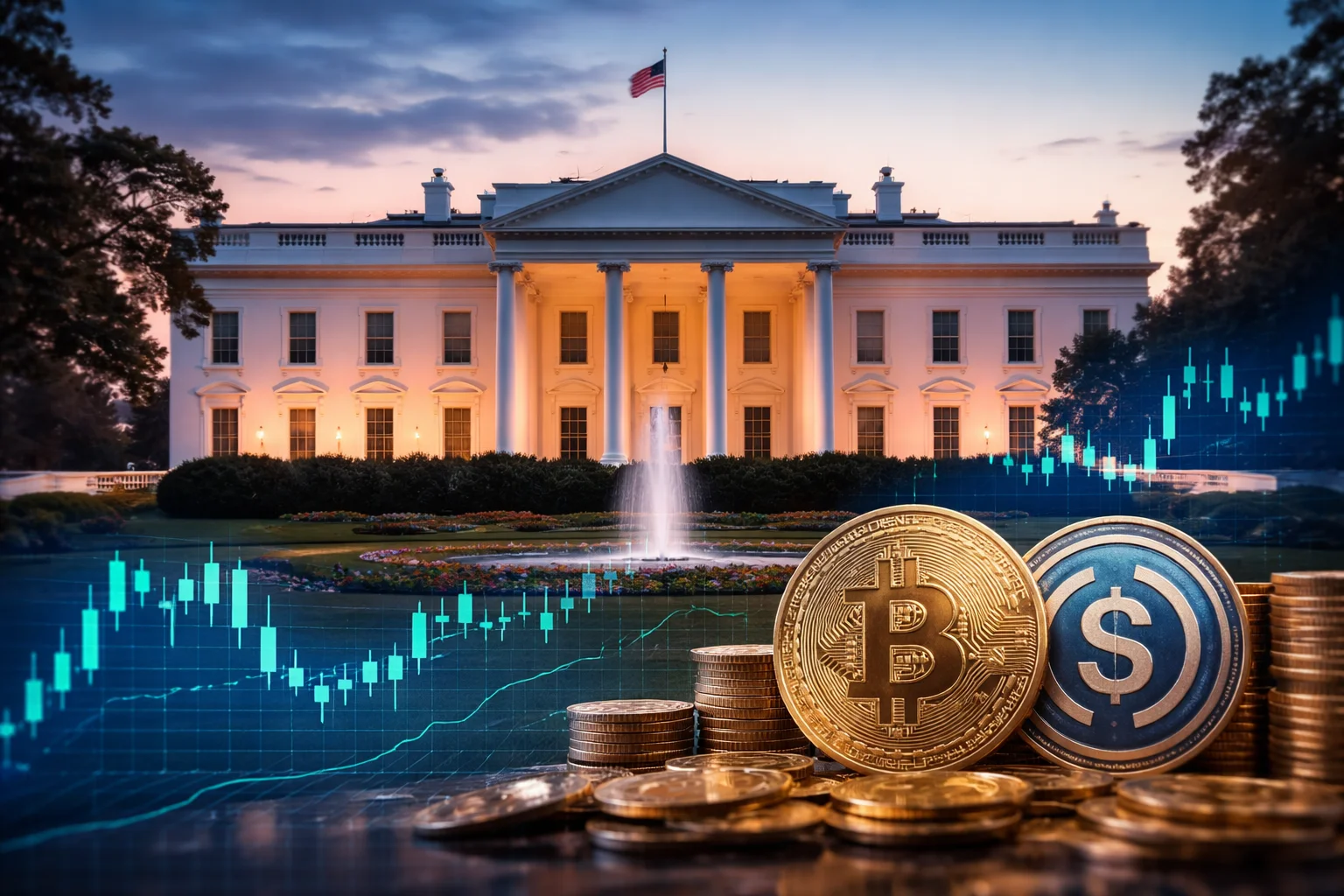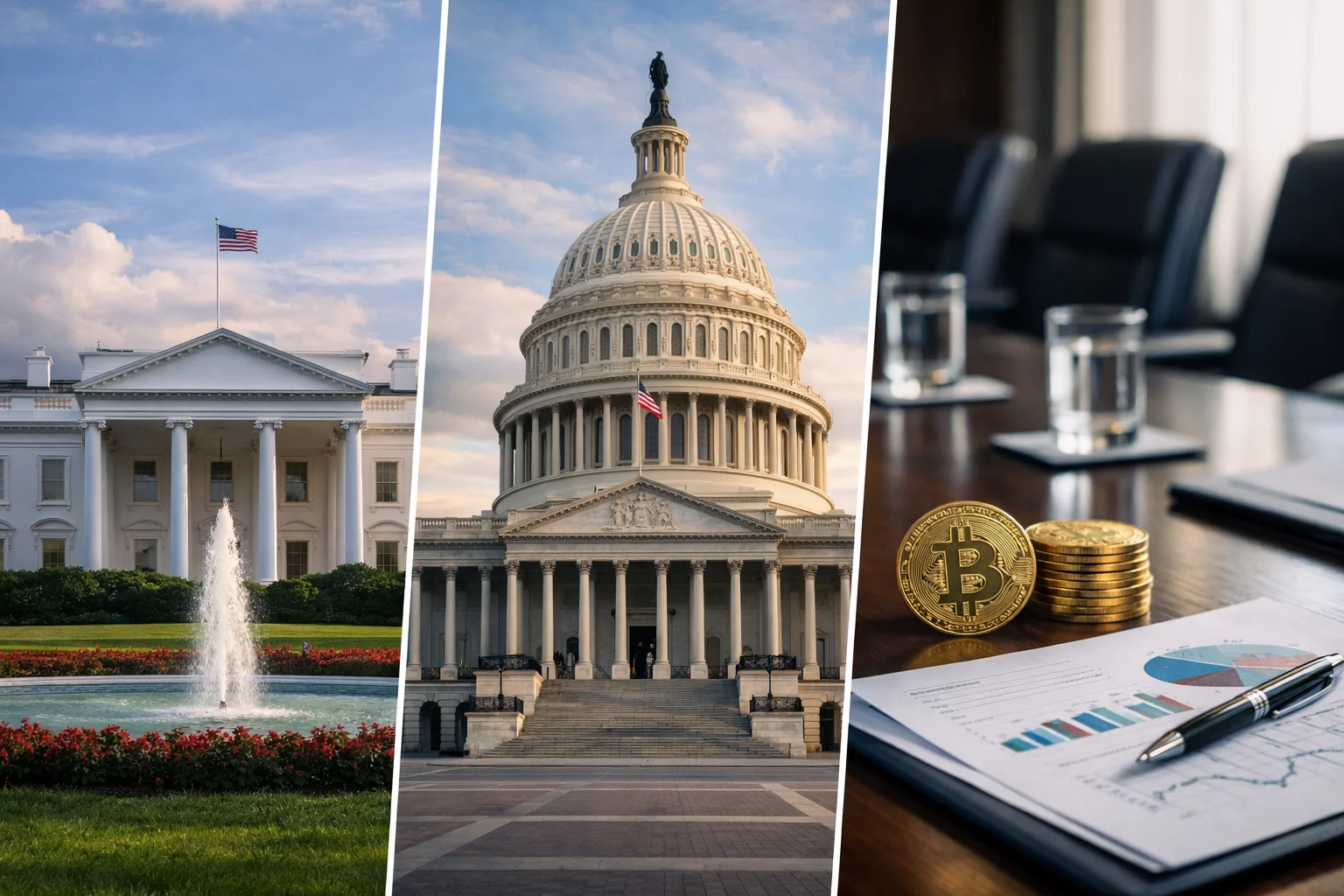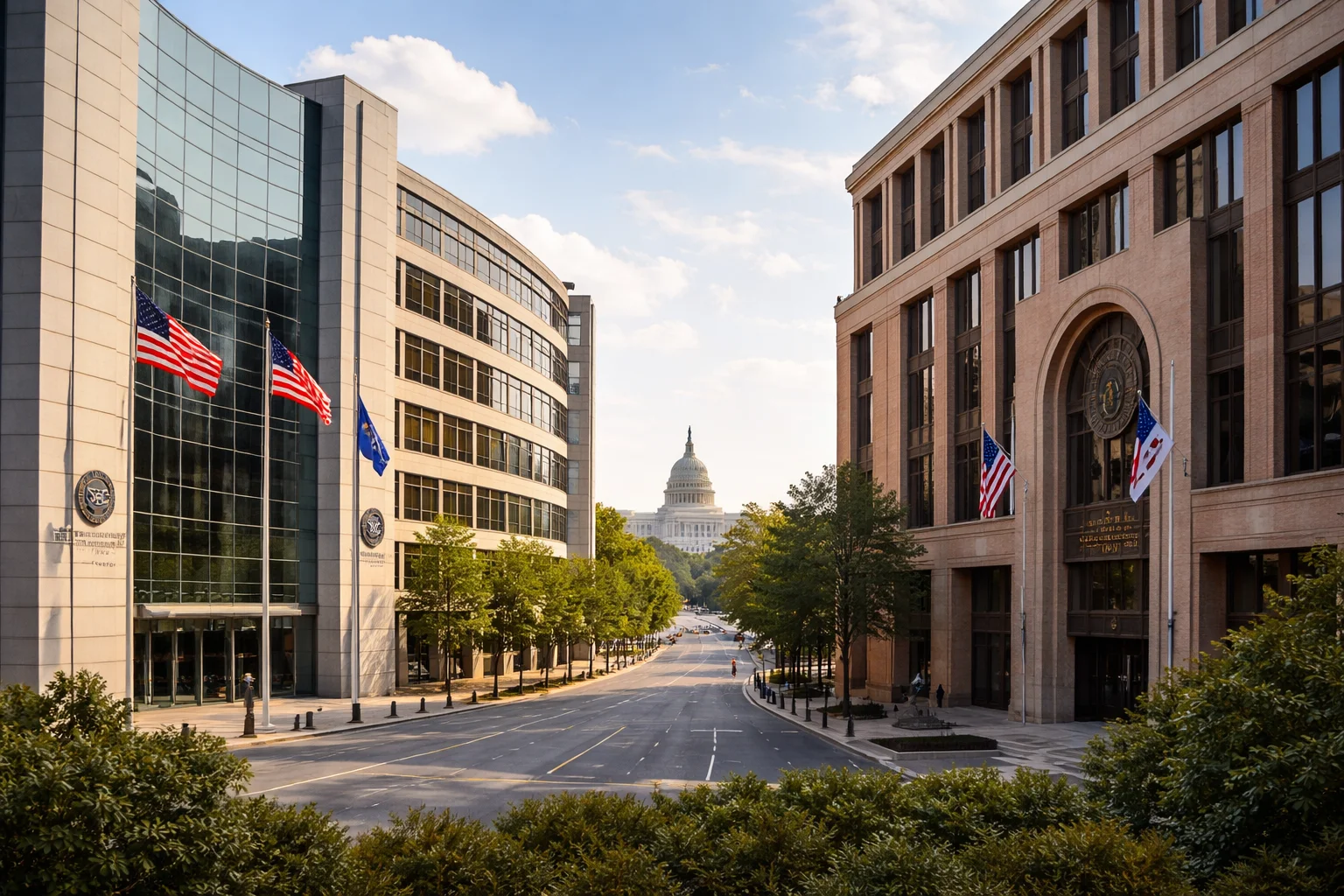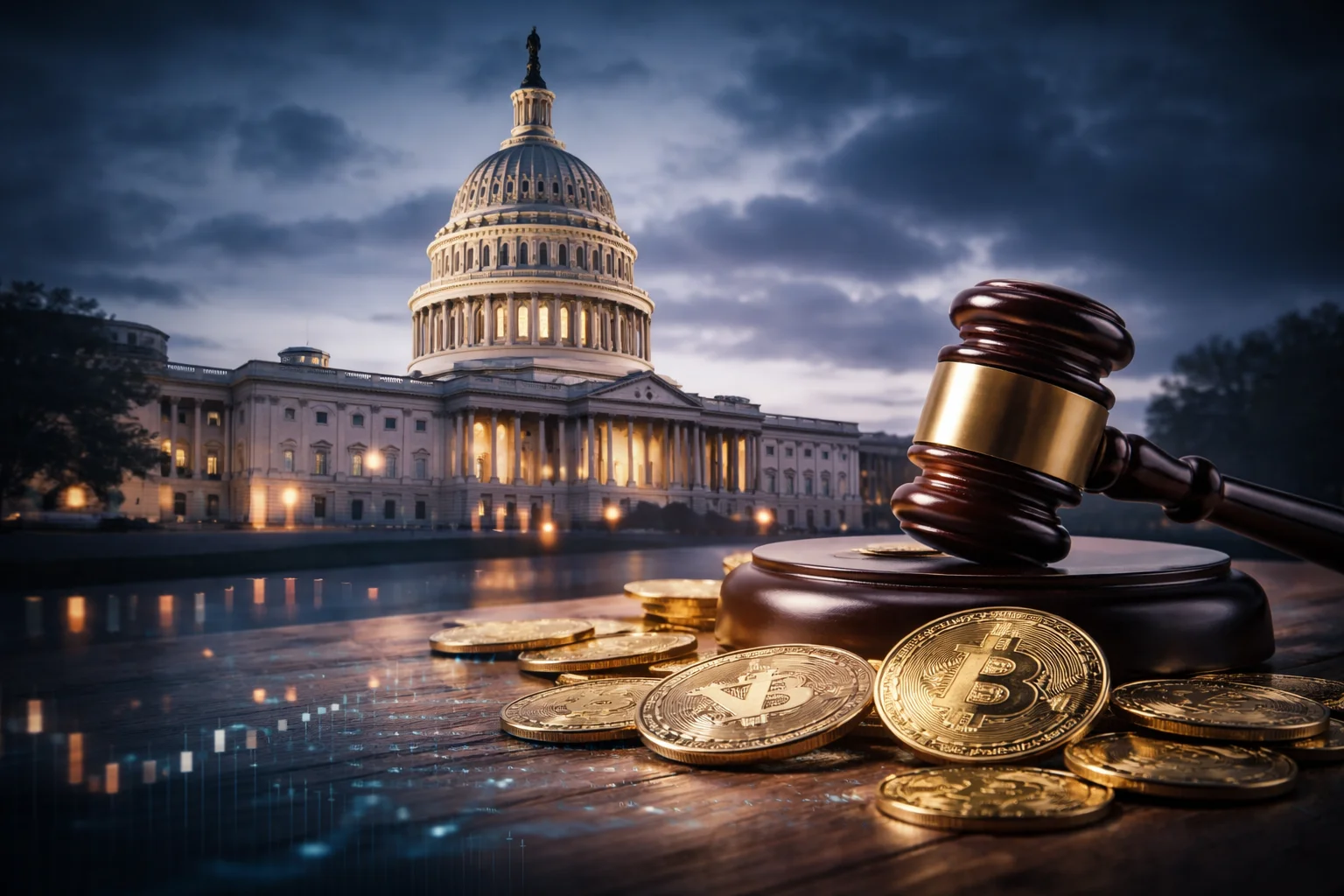Regulation
This page lists the latest Regulation news and market analysis. Browse articles, expert insights, and updates in this category on JrKripto. Stay informed with in-depth coverage of cryptocurrency trends and developments.
News
Regulation News
Regulation News
Browse all Regulation related articles and news. The latest news, analysis, and insights on Regulation.
Arizona Makes a Crypto Move: Bill Including XRP and BTC Overcomes First Hurdle
Arizona has taken a significant step towards integrating digital assets into the public treasury. The Arizona Senate Finance Committee approved Bill SB1649, known as the "Digital Asset Reserve Fund Bill," by a 4-2 vote, moving it to the next stage. The bill will now go to the Senate Rules Committee and continue its legislative process.SB1649 envisions the establishment of a "Digital Asset Strategic Reserve Fund" to be managed by the state. This fund aims to hold certain crypto assets that come into the possession of Arizona authorities under a structured reserve system. Specifically, it is planned that digital assets that are seized, confiscated, or voluntarily transferred to the state will be collected under this new fund.The bill provides a clear framework for how digital assets will be stored and managed under state control. In this respect, Arizona is working on a model that shows that crypto assets can be addressed not only from the perspective of the private sector or individual investors, but also from a public finance perspective. XRP Explicitly Defined as a Reserve AssetOne of the most striking elements of SB1649 is the explicit inclusion of XRP among the eligible assets for the reserve. The bill clearly states that XRP and other eligible digital instruments can be held within the reserve in cases of state seizure or voluntary takeover.This explicit reference has symbolic significance in the crypto market, particularly for XRP. The mention of a specific token by name in a state-level legal document is considered a significant sign of institutional and public acceptance of digital assets.However, the bill focuses on how to manage assets already under state control, rather than initiating a new investment program. In other words, it aims not for Arizona to directly purchase crypto from the market, but rather to hold existing and future digital assets within an institutional framework.Custody and Management Framework DefinedAccording to the bill, the management of the reserve fund will be given to the Arizona State Treasurer. The Treasurer will be responsible for the secure custody of digital assets and the management of the portfolio. However, this authority is not unlimited; There is a requirement to comply with a defined custody plan and regulated oversight solutions. The text states that tools such as regulated custody services and exchange-traded products can be used. Thus, the aim is to ensure the security of digital assets through regulated solutions. Not leaving control entirely to private platforms is a key element in terms of protecting public oversight.The bill does not directly replace Arizona's existing "Revised Uniform Fiduciary Access to Digital Assets Act." Instead, it establishes a complementary structure for how digital assets held by public institutions will be stored.The process will continue in the Senate and the House of RepresentativesSB1649, which passed the Finance Committee with a 4-2 vote, will now be considered in the Senate plenary session. If it receives majority support there, it will be sent to the Arizona House of Representatives. Amendments to the bill may be proposed during the House stage.If the bill is enacted in its current form, Arizona could become one of the first US states to create a special reserve structure for seized or acquired crypto assets. The explicit designation of XRP as a reserve asset is seen as a development that could open this model up to debate on a national scale.

Hong Kong Accelerates Crypto Steps: Stablecoin Licenses are in the Agenda
Hong Kong is preparing for a significant milestone in its goal of becoming a global hub for digital assets. The region's Chief Financial Officer, Paul Chan Mo-po, announced that the first stablecoin licenses will begin to be issued next month. While the licenses will initially be shared with a limited number of companies, officials emphasize that the process will be controlled and selective.In his speech at CoinDesk's Consensus Hong Kong conference, Chan stressed that the institutions receiving licenses must have innovative use cases, sustainable and reliable business models. Strong regulatory compliance capacity will also be among the key criteria. This approach demonstrates that the region prioritizes building robust infrastructure and trust rather than rapid growth.Custody services and legal framework are expandingIn addition to stablecoin licenses, the licensing regime for companies providing crypto asset custody services is also being clarified. Chan stated that a new legal regulation concerning this area is planned to be submitted to the Legislative Council in the summer. Considering this alongside the currently existing framework, it appears that Hong Kong aims to create a holistic regulatory structure that covers the entire digital asset ecosystem. According to officials, these steps will both strengthen investor protection and increase the interest of institutional actors in the region. Hong Kong's proactive approach is noteworthy at a time when regulatory clarity is gaining importance on a global scale.Tokenization and DeFi-TradFi ConvergenceIn his speech, Paul Chan stated that three fundamental trends are maturing: tokenization of real-world assets, increased interaction between decentralized finance (DeFi) and traditional finance, and the intersection of artificial intelligence and digital assets.On the tokenization side, Chan stated that the transition from the "trial" phase to real application has begun, reminding that traditional financial instruments such as government bonds and money market funds are starting to be issued on-chain. Thanks to digital ledger technology, clearing processes are accelerating, assets are becoming divisible, and many previously illiquid products are opening up to new investor groups.Emphasis on Artificial Intelligence and "machine economy"Another topic that Chan highlighted was the rise of artificial intelligence. He said that with the development of AI agents capable of making autonomous decisions, the first signals of a new era called the "machine economy" can be seen. In this scenario, AI agents will be able to hold digital assets, pay for services, and transact with each other on-chain.SFC DecisionMeanwhile, the Hong Kong Securities and Futures Commission (SFC) announced new policy updates for the crypto market. The regulator published a high-level framework for licensed platforms to offer crypto perpetual contracts to professional investors.Under the new regulation, perpetual products will only be available to professional investors. Platforms are required to implement strict risk management rules such as leverage limits, collateral requirements, liquidation mechanisms, and transparency obligations. These products will also be under constant supervision, and platforms will need to prove they have strong internal control systems.The SFC also allowed licensed brokerage firms to provide financing for crypto transactions using a wider range of collateral. The regulation specifically stated that Bitcoin and Ether could be accepted as collateral. However, customer suitability assessments and internal risk controls will play a critical role in this process.SFC Administrator Eric Yip said that this year's focus is on market quality, not rapid expansion. The priority is; The goals are to increase liquidity, strengthen price discovery, and build investor confidence. Within this framework, affiliated companies will be permitted to act as market makers under certain conditions, but governance and oversight rules will be strict to prevent conflicts of interest.

UK Files Lawsuit Against an Exchange for Illegal Crypto Advertising
Cryptocurrency oversight in the UK has entered a new phase. The country's financial regulator, the Financial Conduct Authority (FCA), announced it has initiated legal proceedings against the global cryptocurrency exchange HTX. The FCA alleges that HTX promoted its cryptocurrency services to British users in violation of existing financial advertising rules, thus engaging in illegal marketing activities.According to the FCA's statement, the legal proceedings were initiated in October 2025 in the Chancery Division of the High Court of England. The regulator also stated that it recently obtained permission from the court to serve the case outside the UK through alternative channels. This is primarily because HTX is incorporated in Panama and its corporate structure operates outside the UK. HTX was previously known as Huobi Global and had a large global user base. FCA'a warning to HTXThis legal step was taken under the Financial Promotions (FinProm) regime, which came into effect in October 2023 and imposes strict rules on how cryptocurrency companies can advertise to British consumers. The regulation in question mandates that cryptocurrency advertisements must be “fair, transparent, and not misleading.” The FCA emphasizes that promoting cryptocurrencies through social media or websites without adhering to these rules constitutes a clear criminal offense. The regulator also noted that this is not the first time HTX has been warned on this matter. According to the FCA, the exchange had previously been warned for illegal advertising targeting users in the United Kingdom. Despite this, HTX continued its promotional activities on popular platforms such as TikTok, X, Facebook, Instagram, and YouTube. The FCA argues that this constitutes a deliberate violation of the rules. The FCA's assessment also highlighted a lack of transparency regarding HTX's corporate structure. According to the regulator, the company does not clearly share basic information such as its ownership structure and who manages its website. Furthermore, it is stated that the company has gone unanswered for extended periods in response to the FCA's communication attempts. Although HTX has blocked new UK users from registering following the legal proceedings, existing users are reportedly still able to access the platform and encounter what the regulator has deemed “illegal” advertising. Steve Smart, Co-Director of Enforcement and Market Surveillance at the FCA, stated that the aim of the regulations is to create a sustainable and competitive crypto market in the UK. Smart said, “Consumers need access to accurate information to make informed decisions about high-risk assets. HTX’s stance is in stark contrast to the vast majority of firms trying to comply with the regulations.” This case is notable as it marks the first enforcement action initiated by the FCA against a company illegally marketing crypto to British consumers. Additionally, the FCA has requested that social media companies block HTX accounts from being visible in the UK. It has also requested the removal of HTX applications from Google Play and the Apple App Store in the UK. The agency states that these steps are aimed at protecting local investors. HTX has also been added to the FCA’s official Warning List. Users who trade with firms on this list are not eligible for consumer protection mechanisms in the United Kingdom. The FCA points out that investors who trade with such unauthorized platforms have a very low chance of recovering their money if the company ceases operations.

Today at the White House: Crypto Meeting, Stablecoins on the Table
Uncertainty surrounding cryptocurrency regulations in the US has reignited tensions in Washington. As government officials, Wall Street representatives, and leading figures in the crypto sector prepare to meet at the White House on February 10th, the long-standing Clarity Act impasse is seen as entering a critical phase. At the heart of the discussions is the issue of interest-bearing stablecoins, which has become the most contentious topic of debate. Why is stablecoin interest so controversial? Crypto companies argue that stablecoins' ability to offer interest is a natural extension of a modern and efficient financial system. They claim this approach creates additional income opportunities for individual users and supports financial innovation. Coinbase, one of the sector's largest players, generated $355 million in revenue from stablecoin operations in the third quarter of 2025 alone. Companies argue that such returns have become an integral part of their business models and that banning them would cause the US to fall behind in global competition. The picture is quite different for traditional banks. Banks are warning that the proliferation of interest-paying stablecoins could lead to an outflow of approximately $6.6 trillion from deposit accounts. This scenario is seen as a serious risk to the banking system. Bank lobbies argue that these products could erode deposits, weaken the lending mechanism, and threaten financial stability. Further complicating the discussions is the proposed "skinny" master account system by the Federal Reserve. This system would grant some crypto companies limited access to central bank services. Crypto firms believe this access is insufficient for real growth and stability, while banks argue that even limited access could open the door too quickly. Ultimately, the proposal fails to satisfy either side, making compromise difficult. Past experiences show that delays in regulatory processes have severe impacts on the market. Following the February 2nd meeting, the total cryptocurrency market capitalization quickly fell from $2.64 trillion to $2.54 trillion. A bigger shock occurred on January 15th, when the Senate Banking Committee abruptly canceled the vote on the CLARITY Act, causing crypto prices to plummet by approximately 7.5% in minutes, wiping out billions of dollars in value.On the other hand, it is known that the market recovers quickly when agreements are reached. The GENIUS Act, signed on July 18, 2025, triggered a nearly 12% increase in many altcoins in just one week. This example once again demonstrates how critical regulatory clarity is for markets.Today, the market is once again in wait-and-see mode. Even before the meeting concludes, signs of stress are evident. Concerns that stablecoin interest rates could be banned are weakening investor confidence, while the total crypto market capitalization fell by 1.65% in a single day to $2.36 trillion. Bitcoin is trying to hold around the $69,000 level, while Ethereum has retreated to around $2,040.

China Delivers New Blow to Crypto: Decisions Announced
China has once again clarified its tough stance on the cryptocurrency ecosystem. New regulations announced on February 6, 2026, completely ban internet companies from offering any crypto-related services, while also comprehensively targeting the issuance of unverified stablecoins and the tokenization of real-world assets (RWA). This move by Beijing stands out as one of the broadest steps in its gradually tightening anti-crypto policy in recent years. Ban on Internet CompaniesThe new framework directly covers not only financial institutions but also technology and internet companies that form the backbone of the digital economy. Texts published by the People's Bank of China and related regulatory bodies explicitly prohibit internet companies from offering crypto wallets, facilitating crypto payments, or otherwise enabling crypto trading. This directly targets a broad technology ecosystem, including giant platforms like Alibaba, Ant Group, and Tencent. Authorities defend these bans on the grounds of protecting financial stability and preventing illicit capital movements. However, the prevailing view in the market is that the main motivation is the state's desire to maintain absolute control over monetary policy. Especially as the digital yuan (e-CNY) project progresses, it appears that no space is left for any digital currency or token structure originating from the private sector. Another critical pillar of regulation is stablecoins. The Chinese government has directly banned the issuance of yuan-referenced stablecoins without official approval. While stablecoins are becoming increasingly accepted globally for cross-border payments and digital finance infrastructures, Beijing positions these tools as a potential threat to financial sovereignty. This approach also reveals how low China's tolerance is for the emergence of an alternative digital payment ecosystem. Comprehensive ban on RWAsPerhaps the most striking decision was the comprehensive ban on the tokenization of real-world assets. RWA models, which refer to the conversion of real estate, commodities, or financial securities into tokens on the blockchain, are completely banned within China's borders. For RWA platforms operating abroad, the condition is that they can only operate with official approval and under strict supervision. A joint statement by seven major financial associations in China highlighted the dangers of RWA tokenization, including the risk of counterfeit assets, transparency issues, and excessive speculation. These steps also reiterate the fact that cryptocurrency trading remains illegal in the country. General bans initiated in 2021 were intensified throughout 2025, and this final move in 2026 indicates the complete closure of even indirect access channels through internet companies. The official statement reiterates that cryptocurrencies are not legal tender and will not be accepted as a means of payment.

SEC Provides Clear Framework for Tokenized Securities
The U.S. Securities and Exchange Commission (SEC) has published comprehensive guidance on new financial instruments categorized under tokenized securities. Released to the public Wednesday night, this document incorporates joint assessments from the SEC's Corporate Finance, Investment Management, and Trading and Markets divisions, and specifically aims to clarify the legal status of securities represented on blockchain technology.SEC's guidance on tokenized assetsThe SEC's approach in the guidance is quite clear. The issuance of a security in token format or its representation on crypto networks does not exempt it from existing securities legislation. According to the agency, tokenized securities remain subject to the same legal framework as traditional securities. This means that registration obligations, public disclosure rules, and investor disclosure responsibilities remain the same.The guidance defines tokenized securities as the representation of financial instruments defined in federal securities laws in crypto asset format. The SEC emphasizes that holding ownership records, either partially or entirely, on crypto networks does not alter the legal nature of the asset. In other words, the security itself remains the same, even if the technology changes. This step is seen as a continuation of the SEC's efforts to create a clearer and more predictable regulatory framework for crypto asset markets. In November, SEC Chairman Atkins announced that a "token taxonomy" would be created to differentiate between digital assets. The recently published guidance is considered a significant milestone in demonstrating how this approach will be implemented in practice. The SEC categorizes tokenized securities into two main categories. The first group is defined as "issuer-backed tokenized securities." In this model, the issuer directly integrates the blockchain into its own ownership record system. On-chain transfers represent actual security transfers, and investor records are held on crypto networks instead of traditional databases. According to the SEC, this structure is no different from classic securities issuance except for the technical infrastructure. The second category encompasses tokenized securities offered by third parties. In this model, a third party holds the underlying security in custody and offers the investor a tokenized right to that asset. The SEC views this structure as similar to existing custody and ownership regulations and emphasizes that the token format does not affect legal practice. In addition, the guidance also addresses synthetic structures called “linked securities.” These products offer investors exposure to economic returns without providing certain rights, such as voting rights. The SEC states that these structures should also be evaluated under existing securities and derivatives regulations. The publication of the guidance coincides with ongoing work on a comprehensive market structure law for the cryptocurrency market in the US. At the same time, global exchanges and financial platforms are preparing to launch tokenized stocks and similar products. The New York Stock Exchange's announcement that it plans to launch a platform for tokenized US stocks and ETFs, subject to regulatory approval, stands out as one of the most concrete examples of this transformation. In general, this SEC guidance clarifies how existing regulations apply to tokenized securities, rather than introducing new rules for the market.

Crypto Knot in the US: White House Sit Down with Banks
The White House is preparing to bring together top representatives from the banking and crypto sectors next week to try to overcome the Senate deadlock on cryptocurrency legislation. According to Reuters, citing three sources familiar with the matter, the meeting will focus particularly on reward mechanisms related to stablecoins. This has become a key point of disagreement that has hampered progress in the Senate Banking Committee in recent months. The summit will reportedly be organized by the White House crypto council. The discussions will center on uncertainties surrounding the implementation of the GENIUS Act, passed by Congress this summer, which provides a framework for stablecoins. While this legislation prohibits stablecoin issuers from receiving direct interest payments, it doesn't completely close the door on third-party platforms (including crypto exchanges) offering various rewards to users. The banking sector argues that this flexibility could lead to deposit losses. The Blockchain Association is one of the institutions that has confirmed its participation in the meeting. In a statement, the union's CEO, Summer Mersinger, said that Congress has the opportunity at this stage to establish clear and bipartisan rules. According to Mersinger, a framework that protects consumers, encourages responsible innovation, and preserves the US's global leadership in financial technologies should no longer be delayed.What's happening between banks and crypto companies?Recently, tensions between banks and crypto companies have been steadily increasing. Banking unions argue that the insufficient limitation of reward mechanisms in the GENIUS Act will particularly put local and regional banks in a difficult position. The crypto side, on the other hand, argues that banks are trying to suppress competition, that these issues were negotiated before the law was passed, and that the sector was targeted at the last minute. At the heart of the discussions is the question of whether rewards should be considered a form of "interest." This disagreement directly affected the legislative calendar in the Senate. A hearing planned by the Senate Banking Committee in mid-January was canceled at the last minute after crypto exchange Coinbase withdrew its support. Coinbase cited its dissatisfaction with the lack of clarity regarding the approach to tokenized shares and stablecoin rewards. The Senate Agriculture Committee is preparing to hold a hearing this week; however, it is reported that the draft text presented last week did not receive sufficient support from the Democrats. On the White House side, there is a clear will to accelerate the process. Patrick Witt, who serves on the President's Digital Assets Advisory Council, emphasized that the US should pass comprehensive legislation regarding the crypto market structure without delay. Witt noted that the current crypto-friendly political climate may not be permanent and that action should be taken before momentum is lost. According to him, such legislation is inevitable; the only debate is when it will be implemented. The summit planned for next week is therefore seen as a critical turning point. It is expected that the deepening disagreements between banks and crypto companies will be discussed, and that common ground will be sought, particularly regarding stablecoin rewards. The messages that emerge from the meeting could provide important signals determining whether the Senate negotiations will get back on track and what path the US will take in crypto regulation.

The Era of Crypto ETFs in Japan Could Begin in 2028
A significant shift in Japan's regulatory approach to cryptocurrency markets is underway. The country's financial regulator, the Japan Financial Services Agency (FSA), is considering adding cryptocurrencies to the list of eligible assets for spot exchange-traded funds (ETFs). According to Nikkei Asia, Japan could approve its first spot crypto ETFs by 2028. Such a move would effectively end the FSA's current ban on spot crypto ETFs. This timeline is seen as a further postponement of expectations for the launch of crypto ETFs in Japan. Indeed, a KPMG Japan executive argued in August 2025 that approval of Bitcoin ETFs would be difficult before 2027. Recent developments indicate that the regulatory process is proceeding cautiously but steadily. On the other hand, the picture regarding investor demand is quite clear. Nomura Holdings executive Hajime Ikeda, referring to a previously shared survey, stated that more than 60% of Japanese investors want to invest in crypto assets “in some way.” This data shows that the regulator's ETF move is not only aimed at aligning with global trends but also responds to domestic market demand.Nomura and SBI are ready for Japan's first crypto ETFsAccording to Nikkei, Nomura Holdings and financial giant SBI Holdings have developed Japan's first crypto ETF products and are awaiting approval. These ETFs are planned to be listed on the Tokyo Stock Exchange. If approved, investors will be able to access crypto assets through a structure similar to stock or gold ETFs. SBI Holdings confirmed last year that it planned to launch XRP-based ETFs if it received regulatory approval. In a presentation published in August, the company announced that it was working on two separate products. The first of these is the "Gold and Crypto Assets ETF," which allocates 49% of its assets to Bitcoin, while the second is designed as an ETF offering exposure to both Bitcoin and XRP. This structure suggests that crypto products in Japan may not be limited to Bitcoin alone.Examples from the US and Asia are leading the way for JapanGlobally, while Japan's step is delayed, it is not alone. The US and Hong Kong approved their first spot crypto ETFs in 2024. In the US, spot Bitcoin ETFs quickly gained significant interest, reaching approximately $115.8 billion in net assets and a size equivalent to 6.5% of Bitcoin's total market capitalization. Thanks to these products, institutional investors such as pension funds, family offices, and university foundations have been able to enter the crypto markets more easily. The largest ETFs in operation are as follows: The ETFs in Hong Kong, however, differ from the US by offering in-kind creation and redemption options. Funds in the region have direct access to assets such as Bitcoin, Ether, and Solana. In South Korea, work is underway on a Digital Asset Basic Law, and this framework is expected to pave the way for spot crypto ETFs. Recently, Japanese Finance Minister Satsuki Katayama declared 2026 as the "digital year," expressing support for crypto transactions being conducted through exchanges. Katayama stated that in the West, crypto investment products are being adopted as a hedge against inflation through ETF structures, and similar approaches could be seen in Japan.

SEC and CFTC to Meet for Crypto: Eyes on January 27
Following months of uncertainty regarding cryptocurrency regulations in the US, a significant step is being taken. The Securities and Exchange Commission (SEC) and the Commodity Futures Commission (CFTC) have announced they will hold a joint meeting on January 27 to harmonize their oversight and jurisdiction over crypto assets. This move is seen as part of President Donald Trump's efforts to create a regulatory framework consistent with his goal of making the US the "crypto capital of the world."Crypto rules in the US are being discussedAt the event, which will take place at the CFTC headquarters in Washington DC and will be open to the public, the heads of the two agencies, Paul S. Atkins and Michael S. Selig, will outline a coordinated oversight approach to crypto markets. The meeting will also be streamed online. This is seen as a signal of a shift from the long-criticized closed-door regulatory processes to a more transparent era. SEC Chairman Atkins emphasized that companies operating in the crypto markets have been caught between unclear and conflicting regulatory boundaries for years. According to Atkins, this situation stems from a structure based on outdated divisions of jurisdiction that does not reflect today's digital asset ecosystem. CFTC Chairman Selig, on the other hand, argued that alignment between the two institutions would ensure that innovation remains within US borders and pave the way for the sector. This development comes at a time when crypto regulations in the US have been stalled for months. The lack of progress on the CLARITY Act in Congress has particularly disappointed the sector. The draft released by the Senate Banking Committee received harsh criticism from crypto companies, resulting in a delay in the voting process. The Senate Agriculture Committee is trying to move the process forward with a more partisan text. Interestingly, the Agriculture Committee's review date of the draft coincides with the joint meeting of the SEC and CFTC. Confidence in the regulatory process also appears to be weakening. According to data from the prediction market platform Polymarket, investors are increasingly giving less chance to the CLARITY Act becoming law before 2026. The probability ratio in question has fallen by approximately 24 percent compared to its previous peak level. This indicates that regulatory uncertainty has been priced in and expectations have been revised downwards. Disagreements are also noticeable within the crypto community. Cardano founder Charles Hoskinson sharply criticized Ripple CEO Brad Garlinghouse's "a bad law is better than no law" approach. Hoskinson argues that a hastily enacted and problematic regulation will harm the sector in the long run. In contrast, the White House is painting a more optimistic picture, believing that the CLARITY Act will be passed sooner or later, and is calling on industry representatives and public authorities to find common ground. The joint SEC and CFTC event on January 27th is also being read as a symbolic message that years of jurisdictional disputes have ended. Clearer rules are expected to emerge in areas such as spot crypto markets, DeFi applications, tokenized assets, and 24/7 digital marketplaces.

Thailand Makes a Crypto Move: ETFs and Futures are Coming
Thailand is preparing to integrate crypto assets into the country's official financial system with a clearer framework. The Thailand Securities and Exchange Commission (SEC), the country's capital market regulator, plans to implement a new regulatory package this year covering crypto exchange-traded funds (ETFs) and crypto futures. This development was reported by the local newspaper Bangkok Post. According to the report, the SEC is working on detailed rules that will allow the establishment of crypto ETFs and the trading of crypto futures products on official markets. The new regulations are expected to be announced in the first few months of the year, but a clear timeline has not yet been shared. Nevertheless, it is stated that the regulatory body has given its approval in principle to crypto ETFs and that investment and operational details are being finalized. SEC Vice Chairman Jomkwan Kongsakul emphasizes that crypto ETFs offer a significant advantage for investors. According to Kongsakul, these products eliminate the direct need for crypto asset custody, reducing concerns about wallet security and cyberattack risks. This approach aims to facilitate the entry of institutional and more cautious investors into the crypto markets. Thailand Prepares to Position Crypto as an Official Asset ClassUnder the new framework, the Thai SEC plans to treat crypto assets as “another asset class.” This would allow investors to allocate a maximum of 5% of their diversified portfolios to digital assets. The aim is to create a controlled and limited investment space for crypto without completely liberalizing access.In addition to ETF steps, crypto futures are also a significant part of the regulatory agenda. According to the planned structure, crypto futures will be traded under the Thailand Futures Exchange (TFEX) and in accordance with the Futures Act. Kongsakul states that these products will offer investors hedging and more advanced portfolio management opportunities. Furthermore, the recognition of crypto assets as an official underlying asset under the Derivatives Act is also being considered. Thai authorities are not limiting themselves to ETFs and futures. The SEC is also taking steps in the field of tokenization and is working with the Bank of Thailand on a regulatory “sandbox” environment. This structure aims to test tokenized bonds and similar products in a controlled environment. The goal is to support blockchain-based issuance models while limiting the risks of unsupervised retail distribution.On the other hand, regulatory expansion also brings a stricter approach to oversight. The Thai SEC plans to increase oversight, particularly regarding investment advice given via social media and "financial influencer" activities. Accordingly, individuals providing guidance on securities or investment returns will be required to have the status of an authorized investment advisor or broker.This regulatory transformation coincides with a critical period for market participants. Recently, KuCoin Thailand was temporarily suspended by the SEC due to capital adequacy issues. The company argues that the problem stemmed from a shareholder dispute and that there was no liquidity problem. Nevertheless, the crypto market in Thailand remains vibrant. Daily trading volumes on Bitkub, the country's largest exchange, hover around $60 million.

Crypto Bill Stalls in US Senate: Indefinitely Postponed
The Market Structure Act, expected to bring comprehensive regulation to crypto assets in the US, has been plunged back into uncertainty due to political and industry tensions in the Senate. The Senate Banking Committee indefinitely postponed its work on the bill after cryptocurrency exchange Coinbase withdrew its support from the draft text. According to three sources close to the matter, the committee is not expected to return to work on the crypto market for at least several weeks. The committee had planned to hold a "markup" session last week to discuss and vote on amendments to the bill. However, Coinbase's public withdrawal suspended this plan. According to those closely following the process, Republican senators and the White House want the crypto sector to clarify its disagreements with the banking sector, particularly regarding yield restrictions on stablecoins. It seems difficult for the draft to be brought back to the agenda without resolving this issue.Coinbase's withdrawal and the housing agenda could delay the CLARITY Act for monthsAs Bloomberg previously reported, the Senate Banking Committee plans to temporarily step away from the crypto agenda and focus on housing policies. Behind this shift in direction are calls by US President Donald Trump to limit the influence of large institutional investors in the single-family housing market. Trump advocates for individual buyers to have more opportunities in the housing market and points out that rising housing costs have political consequences.Meanwhile, the Senate Agriculture Committee has released its own draft legislation on cryptocurrency market structure. However, industry representatives believe this text lacks sufficient Democratic support and may be more of a partisan initiative. Agriculture Committee Chairman John Boozman acknowledged that despite discussions with Democratic Senator Cory Booker, there are “significant disagreements on key policy issues.” Boozman argues that the draft should move forward despite the lack of compromise. However, the Senate process is not limited to this. For a text from the Agriculture Committee to be voted on in the Senate floor, it must be aligned with the Banking Committee and must surpass at least 60 votes. This necessitates the support of all Republicans as well as persuading some Democratic senators.Patrick Witt, Executive Director of the White House Digital Assets Council, responded sharply to the criticism from the industry. In a post on social media platform X, Witt emphasized that the discussion is about "when" the crypto market structure law will be passed, not "whether it will be passed at all." Witt argued that while the current Republican-dominated draft has flaws, a future Democratic version could be more challenging for the industry. The delays are prolonging regulatory uncertainty in the crypto sector. Coinbase CEO Brian Armstrong previously stated that provisions limiting stablecoin returns favor the US banking sector and disadvantage crypto companies. This objection has been a decisive factor in the process's deadlock. However, some sources indicate that it is still possible for the Banking Committee to reconsider the draft by the end of March. In such a scenario, the Senate could vote on the law in the summer, and the House of Representatives could complete the process in the fall. However, the current situation suggests that achieving a clear and comprehensive legal framework for the US crypto market will be difficult, at least in the short term.

Belarus Gives Green Light to Crypto Banks
Belarus has taken a significant step toward integrating digital assets into its financial system. President Alexander Lukashenko signed a new decree providing a legal framework for crypto banking. According to information reported by the Belarusian state news agency BELTA, Decree No. 19, signed on January 16th and titled "On Certain Issues Regarding Control in the Field of Crypto Banks and Digital Tokens," allows for the establishment and operation of crypto banks in the country. The legal definition for crypto banks has been clarifiedThe new regulation aims to strengthen Belarus's position in the field of financial IT innovation, while also ensuring that crypto banking activities are conducted within a regulated and supervised structure. With this decree, the concept of a "crypto bank" has been clearly defined for the first time in Belarusian law. Accordingly, crypto banks can operate as joint-stock companies that can offer digital token transactions alongside traditional banking, payment, and related financial services.The legal framework paves the way for crypto banks to work not only with blockchain-based products but also with integrated operations using classic financial instruments. Thanks to this structure, banks will be able to offer both token-based transactions and traditional payment and banking services under one roof. Officials emphasize that this model will serve as a bridge between the digital asset economy and classical finance.However, there are certain conditions for obtaining crypto bank status. Accordingly, these institutions must have a registered status in the High-Tech Park, Belarus's special economic zone focused on technology and innovation. In addition, these institutions are required to be included in a special crypto bank register maintained by the National Bank of Belarus. These criteria aim to both encourage the development of the sector and strengthen control mechanisms.Another notable element of the new system is the dual-layered supervisory model. In addition to being subject to the regulations applied to non-bank credit and financial institutions, crypto banks will also have to comply with the decisions of the High-Tech Park Supervisory Board. Officials state that this multi-level supervisory structure aims to provide supervision close to traditional banking standards without hindering the development of innovative financial services.With this decree, the Belarusian government plans for crypto banks to offer customers a hybrid product range. These products will combine the relatively stable structure of traditional banking with the speed and efficiency of token-based transactions. Thus, crypto banks will position themselves as intermediaries facilitating digital asset transactions while also providing access to payment systems and banking services. Since the establishment of the High-Tech Park, the country has offered relatively flexible regulations and tax advantages to attract blockchain and crypto projects. On the other hand, the Belarusian government also views crypto mining as a strategic area. At a government meeting in November, Lukashenko described crypto mining as one way to reduce global dollar dependence and argued that the country's surplus nuclear capacity should be utilized in this area. At the meeting in Minsk, Lukashenko, downplaying concerns about market volatility, stated that crypto assets are an inevitable part of the international search for alternative monetary systems.

New Crypto Law Prepared in Russia: Official Announcement
Russia is preparing to take another step towards opening the cryptocurrency market to individual investors. According to information reported by the state news agency TASS, Anatoly Aksakov, head of the Financial Markets Committee of the State Duma (the lower house of the Russian parliament), announced that a draft law is ready that would allow limited access to crypto assets for unqualified investors. The draft is expected to be on the agenda of the spring parliamentary session.Crypto removed from special regulationAccording to Aksakov, the new regulation aims to make cryptocurrencies a more ordinary financial instrument by removing them from the scope of "special financial regulation." Speaking in an interview with Russia-24 television channel, Aksakov stated, "A draft law has been prepared that removes cryptocurrencies from the realm of special regulation. This means that digital assets will become part of our daily lives." This approach marks a significant change in the long-ambiguous legal status of crypto assets in Russia.According to the draft law, individuals who do not have qualified investor status will not be able to enter the cryptocurrency market completely freely. Instead, an upper limit will be applied for retail investors. Under the current framework, this limit is capped at 300,000 rubles per person. This amount corresponds to approximately $3,800 at the current exchange rate. Aksakov emphasized that professional market participants will not be subject to such a limitation.The new regulation will not be limited to domestic individual transactions. Aksakov stated that if the law is adopted, cryptocurrencies could be used more actively in international transactions. In particular, cross-border payments and the positioning of tokens issued by Russia-based projects abroad are among the prominent goals of the regulation. This approach is considered part of Russia's search for alternatives to traditional financial infrastructures.These statements indicate that Russian authorities have recently adopted a more controlled but relatively flexible stance towards cryptocurrencies. In December, the Central Bank of Russia proposed a framework that would allow unqualified investors to trade cryptocurrencies provided they pass a risk awareness test. Under the same regulation, anonymous or privacy-focused crypto assets were to remain prohibited. Similarly, Russian Finance Minister Anton Siluanov announced that the finance ministry and the central bank were working on a joint approach that would allow limited participation of retail investors in the crypto market. Officials frequently emphasize that caps on transaction volumes and investment amounts are critical in mitigating potential financial and systemic risks.The increasing prominence of cryptocurrencies in the country is also reflected in the questions directed at public institutions. It is noted that among the millions of calls received by the Russian Social Fund throughout 2025, questions related to cryptocurrencies hold a significant place. Citizens question whether pension payments can be made in cryptocurrency or whether mining revenues affect social benefits, while officials remind them that all public payments are made only in rubles.On the other hand, cryptocurrency mining has also begun to gain more importance politically and economically. Some high-ranking officials argue that, although there is no physical cross-border movement, mining contributes to foreign exchange inflow and should be recognized as an export item. In this context, the Moscow Stock Exchange and St. Petersburg have discussed this issue. The St. Petersburg Stock Exchange has announced its readiness to launch cryptocurrency trading once the necessary legal framework comes into effect. According to the current schedule, the new regulations are expected to be implemented by July 1, 2026.

Clarity Act Postponed Until End of January: Bitcoin and 6 Altcoins on the List
A significant step has been taken toward the CLARITY Act (Digital Asset Market Clarity Act), which aims to bring long-awaited clarity to the cryptocurrency market in the US. The bill, introduced by Wyoming Senator Cynthia Lummis, is scheduled to be brought before the Senate in mid-January. This comprehensive text, prepared in addition to H.R. 3633, aims to clarify which institution will oversee digital assets and how.The 278-page draft stands out as the most up-to-date version of the "market structure" regulations that both Republicans and Democrats have been working on for months. Prepared by the Senate Banking Committee, the text aims to reduce the ongoing jurisdictional confusion in the US crypto markets and create a more predictable regulatory environment. At the heart of the CLARITY Act is the long-debated issue of the division of authority between the US Securities and Exchange Commission (SEC) and the Commodity Futures Trading Commission (CFTC) regarding the oversight of digital assets. The bill aims to reduce conflicts that create uncertainty in the markets by more clearly defining which type of crypto asset falls under the supervision of which institution.Supporters argue that this approach can limit market manipulation and create a more stable environment for both individual and institutional investors. The reduction of sudden and unpredictable enforcement processes is seen as critical for long-term institutional participation.New Status for Cryptocurrencies with ETFsOne of the notable sections of the draft text concerns regulations for cryptocurrencies with exchange-traded funds (ETFs). If a crypto asset's ETF is listed on a national exchange in the US, no additional disclosure will be required from the SEC. Details such as who controls the project or the token distribution structure will not be requested separately. In this context, altcoins with ETFs, such as XRP, Solana, Litecoin, Hedera, Dogecoin, and Chainlink, along with Bitcoin and Ethereum, are considered under the same status. This approach is seen as a significant milestone for the altcoin market. Interest Ban on Stablecoins, but Exceptions ExistThe bill also outlines a clear framework regarding stablecoins. Accordingly, users will not be able to earn interest or returns simply by holding stablecoins. However, rewards based on activities such as payments, transfers, providing liquidity, or active use within the platform are allowed. The Senate Banking Committee's draft aims to both protect the consumer and not completely restrict market activities with a "conditional return" approach.This provision remains one of the most controversial topics in the sector. Stablecoin revenues are cited as one of the biggest points of disagreement on the bill.Protection for DeFi DevelopersThe bill also includes the Blockchain Regulatory Certainty Act. Accordingly, DeFi developers who do not control user funds and only develop software will not be considered financial intermediaries. The aim is to bring oversight to structures that manage user assets while protecting open-source development and innovation.Criticisms and Political CalendarSupporters of the bill argue that the US could once again become the center of global crypto innovation. However, figures like Elizabeth Warren are warning that the SEC's powers could be weakened, creating risks for pension funds. Meanwhile, Senate Agriculture Committee Chairman John Boozman has postponed the committee's discussions on the CLARITY Act until the last week of January. This decision is interpreted as an indication that sufficient bipartisan support has not yet been secured. With the Senate Banking Committee expected to release the final text soon, the CLARITY Act is on track to become the most comprehensive framework for US cryptocurrency regulation to date. The final version of the bill and any proposed changes will be closely watched by markets in the coming weeks.

Dubai Takes a Firm Stake in Crypto: Privacy Tokens Banned
Regulations governing crypto assets at the Dubai International Financial Centre (DIFC), Dubai's financial free zone, have been significantly updated. The new Crypto Token Regulatory Framework, implemented by the Dubai Financial Services Authority (DFSA), came into effect on January 12th. The updated framework clearly defines privacy-focused crypto assets, narrows the definition of stablecoins, and directly assigns responsibility for token compliance to licensed companies. The most notable aspect of the new regulations concerns privacy tokens. The DFSA has banned the use of crypto assets designed to conceal transaction history or wallet holders across the DIFC. This ban covers not only trading but also marketing activities, exposure to funds, and derivative products based on these assets. Thus, all financial activities associated with privacy tokens are inaccessible to institutions under the DIFC umbrella. This decision comes at a time of increased market interest in privacy-focused cryptocurrencies. Recently, Monero (XMR) has seen new highs, while Zcash (ZEC) has also experienced a significant increase in trading volume. However, the DFSA believes that such assets are incompatible with global compliance obligations. The institution's approach is based on the Financial Action Task Force (FATF) standards, which mandate the identification of sender and receiver information in crypto transactions. The nature of privacy tokens, which makes this transparency difficult, is considered an unacceptable risk by the regulator.The ban is not limited to tokens alone. Licensed institutions under the DIFC are also no longer allowed to use or offer mixers, tumblers, or other tools that conceal transaction details. This step brings Dubai closer to the centers adopting the strictest stance against privacy-enhancing technologies. While the MiCA framework and upcoming AML restrictions on anonymous crypto activities in the European Union are moving in a similar direction, some centers, such as Hong Kong, theoretically allow privacy tokens but practically impose serious restrictions. Stablecoins are also on the agendaAnother critical aspect of the regulation was the changes made to the definition of stablecoins. The DFSA limited the stablecoin category, which it calls "Fiat Crypto Token," only tokens that are pegged one-to-one to fiat currency and backed by high-quality, liquid assets. It is stipulated that reserves must be sufficient to meet repayment demands even during periods of high market stress. In this context, algorithmic stablecoins were excluded from the definition of stablecoins. Projects like Ethena, which have attracted attention with their rapid growth, are not banned; however, within the DIFC, they are now considered standard crypto tokens, not stablecoins. One of the structural changes made within the framework was leaving the assessment of token suitability directly to the sector. The DFSA will no longer maintain a list of approved crypto assets. Instead, licensed companies operating in the DIFC will assess the suitability of the tokens they offer themselves, be obliged to document these assessments, and review them regularly. Charlotte Robins, DFSA's director of policy and legal affairs, notes that this approach represents a shift towards a more flexible and principles-based model. Across Dubai, however, the picture remains fragmented. The Dubai Virtual Assets Regulatory Authority (VARA), which operates outside the DIFC, imposed an explicit ban on privacy-enhanced cryptocurrencies in 2023. In Abu Dhabi, the Abu Dhabi Global Market (ADGM) is taking a more cautious, risk-based approach.
